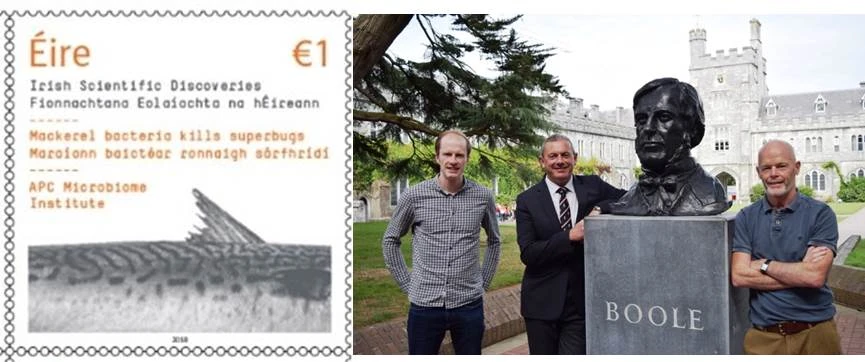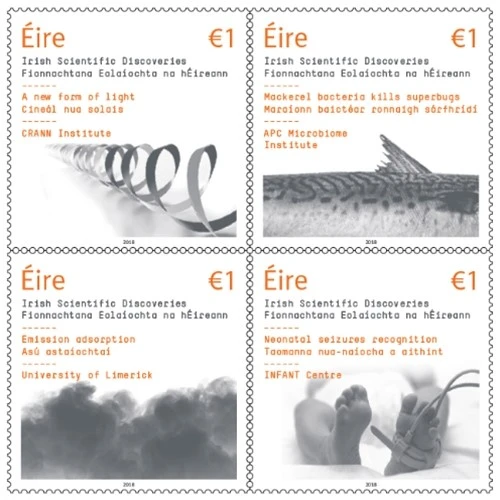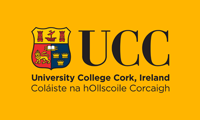News
A Stamp Of Approval

A Stamp Of Approval
APC Microbiome Ireland Research Celebrated In Irish Scientific Discoveries Collector Stamps
Scientific discoveries from UCC researchers feature in two of a series of four €1 stamps launched today by An Post titled Irish Scientific Discoveries. The series of stamps highlight recent discoveries made by scientists who work in pioneering research and development in Ireland.
The science-based stamps represent new areas of research, which are generating fresh knowledge, cutting-edge technology and competitive enterprise. The four topics; new forms of light, fighting superbugs, emissions adsorption and predicting neonatal seizures are examples of innovative and impactful academic research being carried out in academic institutions around the country.
The stamp FIGHTING SUPERBUGS celebrates the discovery of a new antimicrobial called formicin by PhD student Fergus Collins in a team led by Professor Paul Ross and Professor Colin Hill at APC Microbiome Ireland. Antibiotic resistance has been described by the World Health Organisation as a global crisis and alternatives to traditional antibiotics are desperately needed. A bacterium found in the intestine of mackerel is the source of formicin, which can kill a wide range of harmful bacteria. The research is part of a wider APC programme which has uncovered an arsenal of antimicrobials which may have important applications for human and animal health. Fergus Collins is the second member of his family to inspire an An Post stamp; his sister previously featured on a stamp commemorating 100 years of Scouting in Europe.
The other three stamps in the series are:
Predicting Neonatal Seizures which features the work of the INFANT SFI Research Centre at UCC to prevent brain injury in new-born babies. They used artificial intelligence to develop algorithms that can monitor and interpret brain signals. By detecting seizures quickly, babies are treated faster, improving the long-term health outcomes.
New forms of light which features the work of AMBER SFI Research Centre, Trinity College Dublin (TCD), who discovered a new form of light that doesn’t follow our existing rules of angular momentum. This finding could change our understanding of electromagnetic radiation and help to improve speed and security along fibre-optic cables, leading to faster, safer internet connections.
Emissions Absorption which features the work of SSPC SFI Research Centre and Bernal Institute, in the University of Limerick where crystal engineering involves the design of new materials by treating molecules like LEGO® blocks so that they can perform a specific function based on a specific need including the absorption of harmful gases.
Professor Mark Ferguson, Director General of Science Foundation Ireland and Chief Scientific Adviser to the Government of Ireland, said “the collection aims to showcase the excellent science and technology research ongoing across the country and encourages people to engage with it. The selected case studies represent just one small facet of the superb and wide-ranging contributions that Irish scientists are making to international advancements in STEM.”
The stamps are designed by Dublin based design agency, Detail, and are available in the GPO, Dublin, at selected post offices nationwide or online at www.irishstamps.ie
Created by An Post in partnership with Science Foundation Ireland, the Irish Scientific Discovery stamps feed into Ireland’s rich scientific history, recognising its growing reputation for scientific excellence worldwide. This standing is evidenced by Ireland’s ascent in global ranking of scientific citations – now the 10th most innovative country in the world (Global Innovation Index) and 11th for overall IMD World Competitive Ranking, 2017. A 2016 report into Opportunities and Challenges for European Tech Employers also showed 29% of Ireland’s population are now employed in science and technology.



